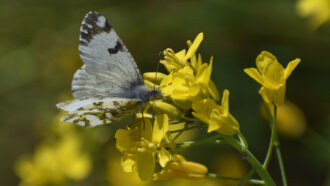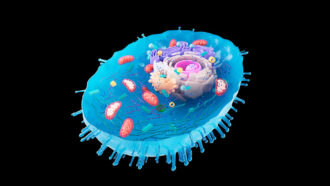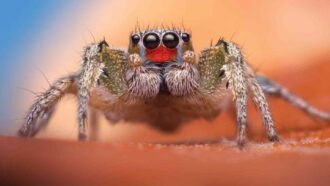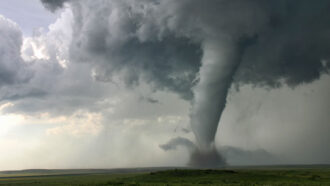All Stories
-
 Environment
EnvironmentBees and butterflies struggle to find flowers in polluted air
Emissions from cars and trucks make it harder for insects to find flowers. That in turn reduces flower visits and pollination, a new study finds.
By Laura Allen -
 Physics
PhysicsExplainer: How do mass and weight differ?
Learn why these terms aren’t the same and which to use where. And should you report your results in kilograms? Pounds? If in doubt, try using newtons.
By Trisha Muro -
 Life
LifeScientists Say: Eukaryote
Eukaryotes are living things whose cells package their genetic material inside a pouch called a nucleus.
-
 Physics
PhysicsWhy some icicles become scallops not spikes
The newfound — and at times quirky — shapes reflect the density of water surrounding submerged ice.
-
 Environment
EnvironmentWidely used pesticides may threaten Earth’s ozone layer
Data show a major class of long-used “eco-friendly” copper chemicals unexpectedly react with soil, making gases harmful to Earth’s protective ozone layer.
-
 Animals
AnimalsSee the world through a jumping spider’s eyes — and other senses
Scientists are teasing out the many ways the spiders’ vision, listening and taste senses differ from ours
By Betsy Mason -
 Animals
AnimalsGoldfish driving ‘cars’ offer new insight into navigation
Fishes’ internal sense of direction is not limited to their natural environment. The latest Wild Things cartoon from Science News for Students.
By Maria Temming and JoAnna Wendel -
 Earth
EarthLet’s learn about tornadoes
Tornadoes are often spawned by thunderstorms — but can also emerge from hurricanes and wildfires.
-
 Environment
EnvironmentScientists Say: Pollution
Pollution is any substance or form of energy released into the environment that is harmful to people or other living creatures.
-
 Space
SpaceWild art? No, it’s a radio image of the heart of our Milky Way
Eyelash-like radio filaments accent the brightest feature in this image — a supermassive black hole.
-
 Environment
EnvironmentClothes dryers may be a major source of airborne microplastics
Scientists thought washing machines were a leading contributor of microplastics. Now it appears dryers may be an even bigger problem.
-
 Psychology
PsychologyAddiction can develop when reward-seeking changes a teen’s brain
Over time, the pleasure disappears and craving grows. That craving causes stress that can drive people to use drugs or pursue unhealthy behaviors again and again.